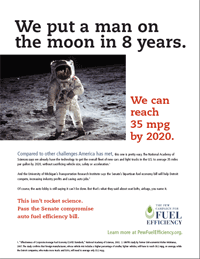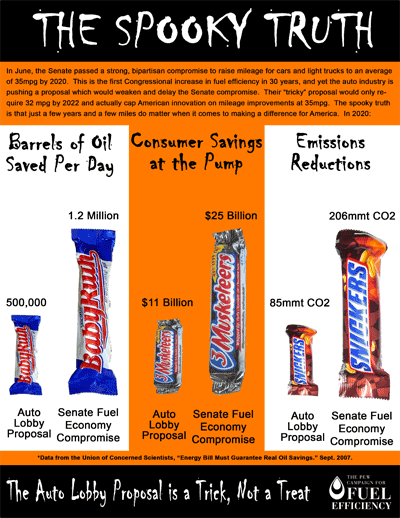This is a guest post by Lorna Li, of Lorna Li : Green 2.0 Marketing.
 As oil prices skyrocket and the climate heats up, the debate around the 2007 Energy Bill, currently being debated in U.S. Congress behind closed doors, is getting hotter. Environmentalists, students, rock stars, and even auto industry workers in the United States are clamoring for a strong, clean 2007 Energy Bill that includes high fuel efficiency standards, more renewable electricity and no nukes. The U.S. auto industry is contentiously divided, as American students rally across the nation, and everyone launches YouTube video campaigns.
As oil prices skyrocket and the climate heats up, the debate around the 2007 Energy Bill, currently being debated in U.S. Congress behind closed doors, is getting hotter. Environmentalists, students, rock stars, and even auto industry workers in the United States are clamoring for a strong, clean 2007 Energy Bill that includes high fuel efficiency standards, more renewable electricity and no nukes. The U.S. auto industry is contentiously divided, as American students rally across the nation, and everyone launches YouTube video campaigns.
Can the U.S. Ever Reach 35 mpg by 2020?
The United States Congress is hard-pressed to choose between 2 fuel efficiency standards – the 35 mpg Corporate Average Fuel Economy (CAFE) Standard, which was approved by the Senate in June, and the U.S. Auto Industry counter-proposal of 32 mpg by 2022.
A large group of auto workers and dealers have broken from the industry in order to support the 35 mpg by 2020 fuel efficiency standard. As oil prices continue to rise, what is at stake in the debate over fuel efficiency is the future of the American auto industry and the livelihood of U.S. autoworkers, not to mention the wallets of American drivers in the years to come.
Adam Lee, a third generation auto dealer, makes this personal plea in his 3-minute video clip.
“My family has been selling American made cars since 1936. My livelihood and the livelihood of over 350 employees who work for us depend upon the success of the automobile industry. Today that strength is severely compromised by the lack of fuel-efficient cars and trucks customers want to buy. …
Without a 35 mile-per-gallon mandate, I’m afraid, global warming and our dependence on foreign oil will continue to get much worse in the long run. And, in the short run, I’m afraid I’ll be stuck with a lot full of cars that no one wants to buy or even worse: This country will no longer have an American auto industry.”
To emphasize the difference between the 2 fuel efficiency proposals, the Pew Campaign for Fuel Efficiency delivered Trick or Treat bags to members of Congress, illustrating the Spooky Truth about the32 mpg by 2022 Auto Lobby proposal.

Power Shift 2007 – American Youth Demand Climate Legislation
On the Monday following the National Day of Climate Action on Saturday, November 3rd, which saw rallies on American campuses across the nation, a huge group of American students recently convened in Washington D.C. for an initiative called Power Shift 2007. The youth arrived to demand bold legislation that effectively combats climate change and global warming and deliver an action-oriented, concrete proposal to move the nation forward towards a greener future. The students asked U.S. lawmakers to:
1.Create 5 million green jobs conserving 20% of our energy by 2015
2. Freeze carbon pollution levels now, reduce 30% by 2020, and 80% by 2050
3. Enact an immediate moratorium on new coal-fired power plants
The youth also highlighted which provisions under consideration in the 2007 Energy Bill had the strongest positive impact on a clean, energy future for America. In addition to the 35 mpg fuel efficiency standard, a Renewable Electricity Standard (RES) requiring 15% of U.S. electricity to be sourced from renewable energy sources was high on the agenda.
Rockers Protest the Nuclear Bailout On YouTube
One of the more frightening provisions under consideration in the hotly debated Energy Bill is a proposal for unlimited loan guarantees to the nuclear power industry, which could amount to the tens of billions of dollars.
Musicians Bonnie Raitt,Jackson Browne and Graham Nash have launched a nuke-free petition drive and YouTube music video urging Congress not to approve federal loan guarantees for new nuclear power plants.
Nuclear power is being touted as a viable energy alternative to greenhouse gas emitting fossil fuels. Under U.S. legislation enacted in 2005, nuclear power qualifies as a “clean technology” because it does not emit carbon gases that contribute to global warming. However, nuclear power is far from clean.
Should Congress even adopt the 35 mpg Corporate Average Fuel Economy standard and 15% Renewable Energy Standard, the nuclear provision would obliterate any environmental gains made by CAFE and RES.
What you can do to support a strong, clean 2007 Energy Bill
The United States is the largest emitter of greenhouse gases and the world’s most oil-addicted nation. Less dependence on foreign oil and leadership in renewable energies can stand to make the U.S. a more model global citizen.
Here’s what you can do to support the United States in making a shift to a cleaner energy future:
1) Support auto industry workers by sending this letter to Congress in support of 35 mpg by 2020.
2) Support a strong, clean Energy Bill that includes both the 35 mpg CAFE standard and 15% Renewable Electricity Standard by signing this petition.
3) Say “NO” to unlimited loan guarantees to the nuclear power industry by signing this petition for a Nuke Free America.